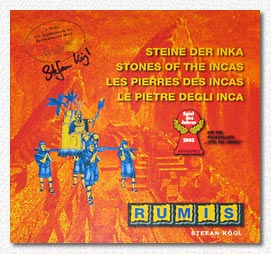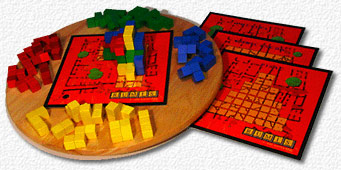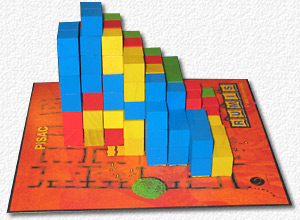
| Designer | Stefan Kögl |
| Publisher | Murmel Spielwerkstatt |
| released | 2003 |
| Players | 2 - 4 |
| Playing Time | 15 - 45 minutes |
 |
||||||||||
|

"A building game with tricky stones" - this is how "Murmel Games" describe their game "Rumis" - "rumis" being the Inca word for stone. And that's what it is. The game contains 4 sets of 11 "stones" made up of between 2 and 4 wooden cubes plus 4 game boards with different layouts of "Maya" temples. In clockwise order players place one of their stones on the board, carefully observing three conditions:
If a player cannot place a stone according to these conditions s/he passes for the rest of the game. Once all have passed the final score is calculated by counting the number of cubes of each color visible looking at the top of the building and subtracting the number of stones of that color, which could not be placed. The player with the most points wins the game.
That's all there is in terms of rules. Explained in two minutes.
While the rules are simple the game itself is very challenging. There are a lot of conditions that need to be constantly monitored and evaluated the players:

As in any good game you are left with many things you want to do in your turn and the difficult decision about what is best in the long run. Especially the balance between maintaining "freedom" for your own stones and locking in other players needs careful consideration. As it is not too difficult to determine the current leader, this balance easily tips towards playing against the leader only to find yourself locked in by the next turn.
The key to Rumis is a good amount of 3D perception. Being able to determine and anticipate the possible positions of the remaining stones in play definitely helps to win. This is particularly important in a 2-player game, which is a pure tactical placement game similar to Sogo, only more difficult to grasp. With 4 players the game can be quite dry if played by 4 "thinkers", which want to consider all possible combinations before making their move. This is when a game will last 45 minutes as stated on the box. However, a mixed group with a good deal of three-dimensional perception will be able to complete a game within 15 to 20 minutes.
 The box contains four boards with different levels of difficulty asking
for different tactics. In addition, Murmel Games made a new map available for download on
their homepages. This provides an excellent replay value of the game.
The box contains four boards with different levels of difficulty asking
for different tactics. In addition, Murmel Games made a new map available for download on
their homepages. This provides an excellent replay value of the game.
This leaves us with the task to compare "Rumis" with "Pueblo". Both games use a board and "tricky" stones that need to be placed on it. "Rumis" is a sort of "Pueblo light" in the best sense - it is faster, it uses less rules and it is more "constructive" than "Pueblo" thereby making it more suitable as a family game.
Rumis was nominated for "Spiel des Jahres 2003" as well as being runner up in the 2001 Hippodice Award. So it may not come as a surprise that we selected Rumis as our "Game of the Month" in February 2004.
| view/add comments |
©2004, Aaron Haag